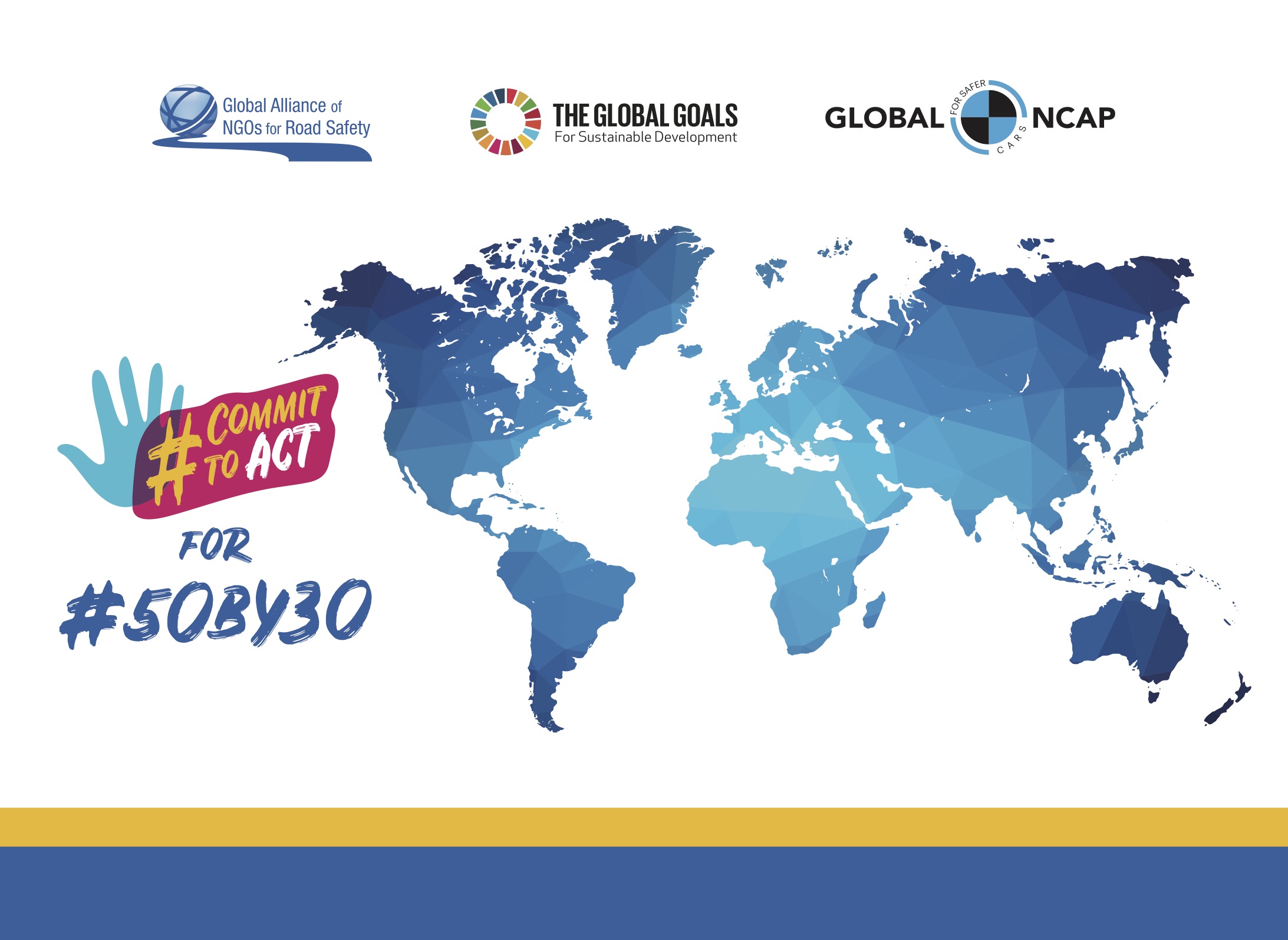
NGOs SAY ENOUGH IS ENOUGH: TIME FOR GOVERNMENTS TO ACT TO SAVE LIVES ON THE ROAD
18 February 2020, Stockholm
Tomorrow, government Ministers from around the world will gather in Stockholm to seek consensus for an ambitious global target to reduce road deaths and serious injuries by 50% by 2030.
In advance of the conference, nongovernmental organizations (NGOs) are holding a series of events to highlight how inaction on road safety has led to road traffic crashes becoming the eighth leading cause of death worldwide and the number one killer of young people. Many of these deaths would be preventable if governments were to implement the policies, enforcement, road and vehicle standards, and post-crash care recommended by the World Health Organization (WHO). Urgent strategic action is needed at global, national, and local levels.
The NGOs’ events will center around “Every Day Counts,” an installation that will use a pile of shoes to represent the shocking reality that 3,700 lives are lost every day in road crashes around the world. The installation is part of an interactive exhibition held by the Global Alliance of NGOs for Road Safety (the Alliance) in Stockholm Central Station from 18–20 February 2020, under the theme “the magnitude of the global road safety crisis and solutions that work.” At the People’s Meeting, dignitaries — including Jean Todt, the UN Secretary-General’s Special Envoy for Road Safety; H.E. Dr. Amani Abou-Zeid, Commissioner for Infrastructure and Energy of the African Union Commission; Mattias Landgren, State Secretary to the Minister for Infrastructure, Government of Sweden; the Rt. Hon. Lord Robertson of Port Ellen, UK parliamentarian and Chairman, FIA Foundation; Dr. Etienne Krug, Director of Social Determinants of Health, WHO; and Zoleka Mandela, Child Health Initiative Global Ambassador — will add a pair of shoes to the pile. Members of civil society will call for world leaders to take urgent action to save lives.
The exhibition will feature “the double standard” in collaboration with Global NCAP, displaying two crashed cars from the same manufacturer but destined for different countries, to highlight the inequality and danger faced by citizens in countries with lower vehicle safety standards. Visitors to the exhibition will also see and hear stories from around the world and have the opportunity to write their own commitments for a 2.5-meter-high world map.
The exhibition will be opened by Rock Sherman, Vice-President Road Network Europe, FedEx Express Europe, an Alliance sponsor, alongside Rochelle Sobel, the Alliance’s Chair of the Board of Directors, and David Ward, Secretary General, Global NCAP.
In parallel, the Alliance will also be releasing its new report, The Day Our World Crumbled: The Human Cost of Inaction on Road Safety, focusing on the devastating impact that road crashes have on the lives of road victims, their families, and the wider community.
The Ministerial Conference is a key moment for NGOs, enabling them to raise the priority of road safety with their top-level Ministers, highlight the cost of continued inaction on real people and real communities, and push for urgent action to save lives. In the run-up to the conference, NGO members of the Alliance have been pushing their governments to #CommitToAct for safer roads. Through Roundtables and #CommitToAct days, they have gathered 45 commitments at local and national levels in 22 countries and have collected more than 50,000 signatures from citizens of 93 countries for the People’s Declaration, which demands that governments commit to putting people first in road safety and act to save lives on the road. Read the Declaration HERE.
Lotte Brondum, Executive Director of the Alliance, said, “Millions of people around the world are dealing with the devastating consequences of inaction on road safety. Road crashes are preventable, and urgent strategic action is needed to get this epidemic under control. Road crashes are the eighth leading cause of death worldwide, killing more people than HIV and malaria each year. We need to see road safety as a public health emergency. NGOs, who are the eyes, ears, and voices of their communities, are ready to help their governments take action.”
Marie Norden, Nationalföreningen för Trafiksäkerhetens Främjande / The National Society for Road Safety (NTF), said, “Even in Sweden, which has some of the safest roads in the world, progress on reducing road deaths has stalled in the past few years. Greater attention is needed on solutions that work, if Sweden is to achieve its target for zero road deaths. In particular, it is time to implement 30 kilometer-per-hour speed limits on roads where vulnerable road users and vehicles mix as recommended in the Stockholm Declaration.”
————————————————————
Events
18 February 2020:
13:00–14:00 Opening of the People’s Exhibition, Stockholm Central Station
15:00–16:30 Presentation of the results of the People’s Survey, Terminus Hotel
17:30–18:30 People’s Meeting, Stockholm Central Station (at the People’s Exhibition)
18 February 2020–20 February 2020:
14:00–20:00 18 February
08:00–18:00 19 and 20 February
The People’s Exhibition will be open to the general public. Guided tours are available for members of the press.
For more information, please contact Liz Man (liz@roadsafetyngos.org).
————————————————
About the Alliance
The Global Alliance of NGOs for Road Safety (the Alliance) was established in 2012 by NGO members of the United Nations Road Safety Collaboration (UNRSC) and currently represents more than 240 member NGOs working in road safety from 90-plus countries around the world. The Alliance is a registered nonprofit organization and is the platform for NGOs worldwide to share knowledge and collectively advocate for road safety and the rights of victims of road traffic crashes. The Alliance provides services to its members in three key areas: 1) networking and sharing, 2) advocacy, and 3) capacity building.